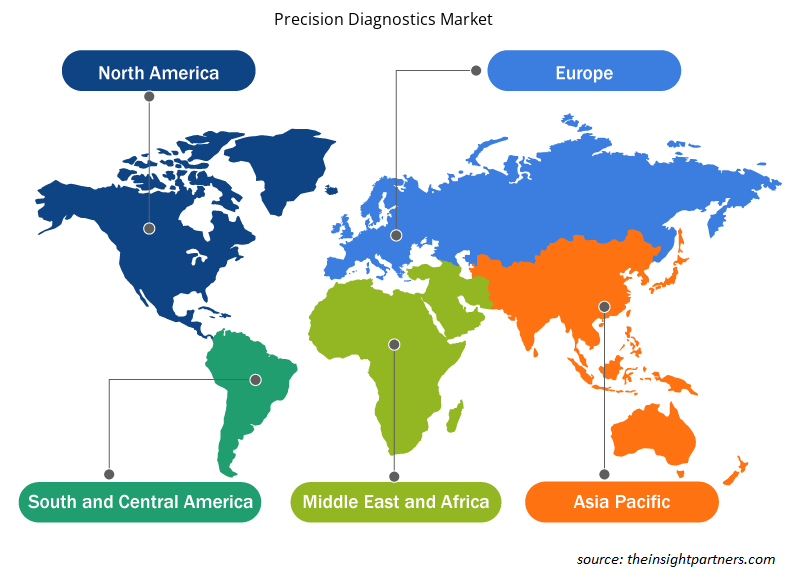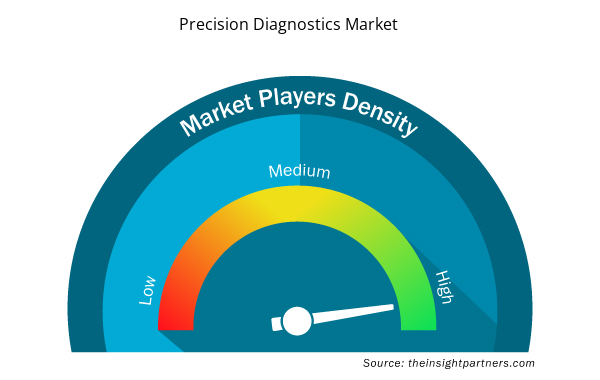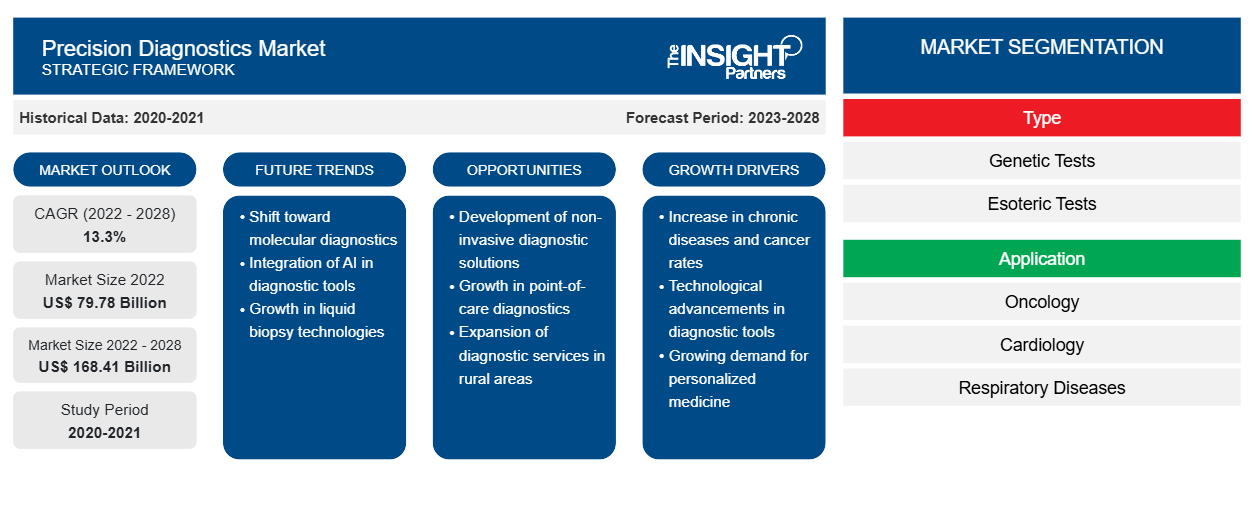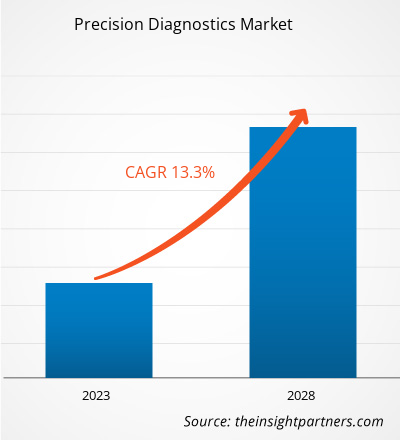[تقرير بحثي] من المتوقع أن يصل سوق التشخيص الدقيق إلى 168،405.71 مليون دولار أمريكي بحلول عام 2028 من 79،776.88 مليون دولار أمريكي في عام 2022؛ ومن المتوقع أن ينمو بمعدل نمو سنوي مركب قدره 13.3٪ من عام 2022 إلى عام 2028.
التشخيص الدقيق هو أحد طرق تشخيص الأمراض التي تشرح حالة المريض بشكل مفصل ودقيق، ويساعد المتخصصين في الرعاية الصحية على تنفيذ إجراءات العلاج بطريقة فعالة وكفؤة، ويستخدم لعلاج مرض السكري والسرطان وأمراض أخرى باستخدام اختبارات مختلفة، بما في ذلك الاختبارات الباطنية والاختبارات الجينية وغيرها.
يتم تقسيم سوق التشخيص الدقيق على أساس النوع والتطبيق والمستخدم النهائي والجغرافيا. من خلال الجغرافيا، يتم تقسيم السوق إلى أمريكا الشمالية وأوروبا وآسيا والمحيط الهادئ والشرق الأوسط وأفريقيا وSAM. يقدم تقرير سوق التشخيص الدقيق رؤى وتحليلات متعمقة للسوق، مع التركيز على المعلمات بما في ذلك حجم السوق والاتجاهات والتقدم التكنولوجي وديناميكيات السوق. كما يوفر تحليلًا للمنافسة بين كبار اللاعبين في السوق في جميع أنحاء العالم. علاوة على ذلك، يتضمن التقرير تأثير جائحة COVID-19 على سوق التشخيص الدقيق في جميع المناطق.
قم بتخصيص هذا التقرير ليناسب متطلباتك
ستحصل على تخصيص لأي تقرير - مجانًا - بما في ذلك أجزاء من هذا التقرير، أو تحليل على مستوى الدولة، وحزمة بيانات Excel، بالإضافة إلى الاستفادة من العروض والخصومات الرائعة للشركات الناشئة والجامعات
- احصل على أهم اتجاهات السوق الرئيسية لهذا التقرير.ستتضمن هذه العينة المجانية تحليلاً للبيانات، بدءًا من اتجاهات السوق وحتى التقديرات والتوقعات.
يعود نمو سوق التشخيص الدقيق إلى العدد المتزايد من الدراسات الجارية لتطوير علاج جديد للسرطان والمبادرات الحكومية لخلق الوعي فيما يتعلق بالتشخيص الدقيق بين العاملين في مجال الصحة المجتمعية. ومع ذلك، فإن التكلفة العالية المرتبطة بالتشخيص والطب الدقيق تحد من نمو السوق.
رؤى السوق:
ارتفاع الطلب على علاج الأورام والاضطرابات الأخرى يدفع سوق التشخيص الدقيق إلى النمو
يتم تطبيق مفهوم الطب الدقيق بقوة في رعاية الأمراض النادرة. على الرغم من أنه أكثر شيوعًا في علم الأورام ، إلا أنه ينتشر تدريجيًا إلى تخصصات أخرى. إن الانتشار المتزايد للسرطان والحالات المتزايدة من الاضطرابات العصبية النادرة يزيدان من الطلب على الطب الدقيق، مما يدفع نمو سوق التشخيص الدقيق العالمي. علاوة على ذلك، وفقًا للتحالف العصبي، تم تسجيل حوالي 14.7 مليون حالة عصبية في عام 2019، حيث يعاني ما لا يقل عن 1 من كل 6 أشخاص من حالة عصبية واحدة أو أكثر. وفقًا للمعهد الوطني للسرطان، من المتوقع أن يرتفع عدد حالات السرطان الجديدة إلى 29.5 مليون بحلول عام 2040، مع زيادة الوفيات المرتبطة بالسرطان بمقدار 16.4 مليون. وفقًا لمنظمة الصحة العالمية، يساهم مرض الزهايمر، الشكل الأكثر شيوعًا للخرف، في ما يقرب من 60-70٪ من الحالات. علاوة على ذلك، اعتبارًا من سبتمبر 2021، يعيش أكثر من 55 مليون شخص مع الخرف في جميع أنحاء العالم، وهو ما يمثل ما يقرب من 10 ملايين حالة جديدة سنويًا. علاوة على ذلك، فإن الطلب المتزايد على إجراءات العلاج في علم الأورام والاضطرابات الأخرى يؤدي إلى زيادة اعتماد إجراءات العلاج.
علاوة على ذلك، فإن العدد المتزايد من التعاونات الاستراتيجية بين شركات الأدوية الحيوية لتطوير الأدوية المستهدفة لعلاج مجموعة معينة من المرضى بناءً على احتياجاتهم المحددة وتوفير إجراءات وخدمات علاجية فعالة يزيد من عدد التجارب السريرية. على سبيل المثال، تعاونت شركة Personal Genome Diagnostics Inc. ومستشفى ماساتشوستس العام لتعزيز تطوير خدمات العلاج الفعالة في عام 2021. في أبريل 2022، تم تشكيل Precision Cancer Consortium (PCC) كتعاون جديد لشركات الأدوية برؤية مشتركة لتوفير اختبارات شاملة لجميع مرضى السرطان في جميع أنحاء العالم. وبالتالي، فإن التطبيق المتزايد في علم الأورام والاضطرابات الأخرى يدفع نمو سوق التشخيص الدقيق.
رؤى مبنية على النوع
بناءً على النوع، يتم تقسيم سوق التشخيص الدقيق إلى اختبارات وراثية واختبارات باطنية وغيرها. في عام 2022، سيستحوذ قطاع الاختبارات الوراثية على أكبر حصة من السوق. علاوة على ذلك، من المتوقع أن يسجل نفس القطاع أعلى معدل نمو سنوي مركب بنسبة 13.8٪ خلال الفترة المتوقعة.
رؤى قائمة على التطبيق
بناءً على التطبيق، يتم تقسيم سوق التشخيص الدقيق إلى علم الأورام وأمراض القلب وأمراض الجهاز التنفسي والمناعة وغيرها. ويحتل قطاع علم الأورام الحصة الأكبر في السوق في عام 2022. علاوة على ذلك، من المتوقع أن يسجل نفس القطاع أعلى معدل نمو سنوي مركب بنسبة 13.8٪ خلال الفترة المتوقعة.
رؤى تعتمد على المستخدم النهائي
بناءً على المستخدم النهائي، يتم تقسيم سوق التشخيص الدقيق إلى المختبرات السريرية والمستشفيات والرعاية المنزلية وغيرها. ويحتل قطاع المختبرات السريرية الحصة الأكبر في السوق في عام 2022. علاوة على ذلك، من المتوقع أن يسجل نفس القطاع أعلى معدل نمو سنوي مركب بنسبة 13.8% خلال الفترة المتوقعة.
يركز اللاعبون في سوق التشخيص الدقيق على تبني استراتيجيات عضوية، بما في ذلك إطلاق المنتجات وتوسيع نطاقها، لتوسيع نطاق وجودهم ومحفظة منتجاتهم في جميع أنحاء العالم وتلبية الطلبات المتزايدة.
منصة إدارة الأحداث
رؤى إقليمية حول سوق التشخيص الدقيق
لقد قام المحللون في Insight Partners بشرح الاتجاهات والعوامل الإقليمية المؤثرة على سوق التشخيص الدقيق طوال فترة التوقعات بشكل شامل. يناقش هذا القسم أيضًا قطاعات سوق التشخيص الدقيق والجغرافيا في جميع أنحاء أمريكا الشمالية وأوروبا ومنطقة آسيا والمحيط الهادئ والشرق الأوسط وأفريقيا وأمريكا الجنوبية والوسطى.

- احصل على البيانات الإقليمية المحددة لسوق التشخيص الدقيق
نطاق تقرير سوق التشخيص الدقيق
| سمة التقرير | تفاصيل |
|---|---|
| حجم السوق في عام 2022 | 79.78 مليار دولار أمريكي |
| حجم السوق بحلول عام 2028 | 168.41 مليار دولار أمريكي |
| معدل النمو السنوي المركب العالمي (2022 - 2028) | 13.3% |
| البيانات التاريخية | 2020-2021 |
| فترة التنبؤ | 2023-2028 |
| القطاعات المغطاة | حسب النوع
|
| المناطق والدول المغطاة | أمريكا الشمالية
|
| قادة السوق وملفات تعريف الشركات الرئيسية |
|
كثافة اللاعبين في سوق التشخيص الدقيق: فهم تأثيرها على ديناميكيات الأعمال
يشهد سوق التشخيص الدقيق نموًا سريعًا، مدفوعًا بالطلب المتزايد من المستخدم النهائي بسبب عوامل مثل تفضيلات المستهلكين المتطورة والتقدم التكنولوجي والوعي المتزايد بفوائد المنتج. ومع ارتفاع الطلب، تعمل الشركات على توسيع عروضها والابتكار لتلبية احتياجات المستهلكين والاستفادة من الاتجاهات الناشئة، مما يؤدي إلى زيادة نمو السوق.
تشير كثافة اللاعبين في السوق إلى توزيع الشركات أو المؤسسات العاملة في سوق أو صناعة معينة. وهي تشير إلى عدد المنافسين (اللاعبين في السوق) الموجودين في مساحة سوق معينة نسبة إلى حجمها أو قيمتها السوقية الإجمالية.
الشركات الرئيسية العاملة في سوق التشخيص الدقيق هي:
- شركة كويست دياجنوستيكس
- كياجن
- شركة سويس للتشخيص الدقيق المحدودة
- شركة فيليبس الملكية
- لانثيوس للتصوير الطبي، المحدودة.
إخلاء المسؤولية : الشركات المذكورة أعلاه ليست مرتبة بأي ترتيب معين.

- احصل على نظرة عامة على أهم اللاعبين الرئيسيين في سوق التشخيص الدقيق
حسب الجغرافيا
بناءً على الجغرافيا، يتم تقسيم سوق التشخيص الدقيق إلى أمريكا الشمالية (الولايات المتحدة وكندا والمكسيك)، وأوروبا (المملكة المتحدة وألمانيا وفرنسا وإيطاليا وإسبانيا وبقية أوروبا)، وآسيا والمحيط الهادئ (الصين واليابان والهند وأستراليا وكوريا الجنوبية وبقية آسيا والمحيط الهادئ)، والشرق الأوسط وأفريقيا (الإمارات العربية المتحدة والمملكة العربية السعودية وجنوب أفريقيا وبقية الشرق الأوسط وأفريقيا)، وأمريكا الجنوبية والوسطى (البرازيل والأرجنتين وبقية أمريكا الجنوبية والوسطى).
نبذة عن الشركة
- شركة كويست دياجنوستيكس
- كياجن
- شركة سويس للتشخيص الدقيق المحدودة
- شركة فيليبس الملكية
- لانثيوس للتصوير الطبي، المحدودة.
- شركة سيمنز هيلثينيرز ايه جي
- أبوت
- شركة نوفارتيس ايه جي
- سانوفي
- شركة باير ايه جي
- التحليل التاريخي (سنتان)، السنة الأساسية، التوقعات (7 سنوات) مع معدل النمو السنوي المركب
- تحليل PEST و SWOT
- حجم السوق والقيمة / الحجم - عالميًا وإقليميًا وقطريًا
- الصناعة والمنافسة
- مجموعة بيانات Excel



Report Coverage
Revenue forecast, Company Analysis, Industry landscape, Growth factors, and Trends

Segment Covered
This text is related
to segments covered.

Regional Scope
North America, Europe, Asia Pacific, Middle East & Africa, South & Central America

Country Scope
This text is related
to country scope.
الأسئلة الشائعة
Precision diagnostics are disease diagnosis methods that explain the patient’s condition in a detailed and precise manner. It helps healthcare professionals to carry out treatment procedures in an effective and efficient manner. It is used to cure diabetes, cancer, and other disorders using various diagnostics tests.
The factors that are driving the growth of market are increasing demands of precision medicines and rising application of precision diagnostics. However, high investments involved in the R&D of precision medicine and diagnostic kits is the major factor hindering the precision diagnostics market growth.
The precision diagnostics market majorly consists of the players, such as Quest Diagnostics Incorporated; QIAGEN; Swiss Precision Diagnostics GmbH; Koninklijke Philips N.V.; Lantheus Medical Imaging, Inc.; Siemens Healthineers AG; Abbott; Novartis AG; Sanofi; and Bayer AG.
The market is estimated to grow at a CAGR of 13.3% during the forecast period.
The precision diagnostics market is estimated to be valued at US$ 79,776.88 million in 2022.
The precision diagnostics market is expected to be valued at US$ 168,405.71 million in 2028.
North America accounts for the major market share of precision diagnostics market in 2022 due to increasing prevalence of cancer and chronic cases in the region and increasing initiatives by government and companies operating in the country.
The colorectal cancer market is analyzed in the basis of type, application, and end user. Based on type, the market is segmented into genetic tests, esoteric tests, and others. The genetic tests segment held the largest share of the market. Moreover, the same segment is anticipated to register the highest CAGR in the forecast period.
Asia Pacific is expected to be the fastest growing region in precision diagnostics market over the forecast period due to developing healthcare infrastructure, enormous population base, growing prevalence of chronic diseases, growing government efforts, and technological improvement in the sector.
Trends and growth analysis reports related to Life Sciences : READ MORE..
The List of Companies - Precision Diagnostics Market
- Quest Diagnostics Incorporated
- QIAGEN
- Swiss Precision Diagnostics GmbH
- Koninklijke Philips N.V.
- Lantheus Medical Imaging, Inc.
- Siemens Healthineers AG
- Abbott
- Novartis AG
- Sanofi
- Bayer AG
The Insight Partners performs research in 4 major stages: Data Collection & Secondary Research, Primary Research, Data Analysis and Data Triangulation & Final Review.
- Data Collection and Secondary Research:
As a market research and consulting firm operating from a decade, we have published and advised several client across the globe. First step for any study will start with an assessment of currently available data and insights from existing reports. Further, historical and current market information is collected from Investor Presentations, Annual Reports, SEC Filings, etc., and other information related to company’s performance and market positioning are gathered from Paid Databases (Factiva, Hoovers, and Reuters) and various other publications available in public domain.
Several associations trade associates, technical forums, institutes, societies and organization are accessed to gain technical as well as market related insights through their publications such as research papers, blogs and press releases related to the studies are referred to get cues about the market. Further, white papers, journals, magazines, and other news articles published in last 3 years are scrutinized and analyzed to understand the current market trends.
- Primary Research:
The primarily interview analysis comprise of data obtained from industry participants interview and answers to survey questions gathered by in-house primary team.
For primary research, interviews are conducted with industry experts/CEOs/Marketing Managers/VPs/Subject Matter Experts from both demand and supply side to get a 360-degree view of the market. The primary team conducts several interviews based on the complexity of the markets to understand the various market trends and dynamics which makes research more credible and precise.
A typical research interview fulfils the following functions:
- Provides first-hand information on the market size, market trends, growth trends, competitive landscape, and outlook
- Validates and strengthens in-house secondary research findings
- Develops the analysis team’s expertise and market understanding
Primary research involves email interactions and telephone interviews for each market, category, segment, and sub-segment across geographies. The participants who typically take part in such a process include, but are not limited to:
- Industry participants: VPs, business development managers, market intelligence managers and national sales managers
- Outside experts: Valuation experts, research analysts and key opinion leaders specializing in the electronics and semiconductor industry.
Below is the breakup of our primary respondents by company, designation, and region:

Once we receive the confirmation from primary research sources or primary respondents, we finalize the base year market estimation and forecast the data as per the macroeconomic and microeconomic factors assessed during data collection.
- Data Analysis:
Once data is validated through both secondary as well as primary respondents, we finalize the market estimations by hypothesis formulation and factor analysis at regional and country level.
- Macro-Economic Factor Analysis:
We analyse macroeconomic indicators such the gross domestic product (GDP), increase in the demand for goods and services across industries, technological advancement, regional economic growth, governmental policies, the influence of COVID-19, PEST analysis, and other aspects. This analysis aids in setting benchmarks for various nations/regions and approximating market splits. Additionally, the general trend of the aforementioned components aid in determining the market's development possibilities.
- Country Level Data:
Various factors that are especially aligned to the country are taken into account to determine the market size for a certain area and country, including the presence of vendors, such as headquarters and offices, the country's GDP, demand patterns, and industry growth. To comprehend the market dynamics for the nation, a number of growth variables, inhibitors, application areas, and current market trends are researched. The aforementioned elements aid in determining the country's overall market's growth potential.
- Company Profile:
The “Table of Contents” is formulated by listing and analyzing more than 25 - 30 companies operating in the market ecosystem across geographies. However, we profile only 10 companies as a standard practice in our syndicate reports. These 10 companies comprise leading, emerging, and regional players. Nonetheless, our analysis is not restricted to the 10 listed companies, we also analyze other companies present in the market to develop a holistic view and understand the prevailing trends. The “Company Profiles” section in the report covers key facts, business description, products & services, financial information, SWOT analysis, and key developments. The financial information presented is extracted from the annual reports and official documents of the publicly listed companies. Upon collecting the information for the sections of respective companies, we verify them via various primary sources and then compile the data in respective company profiles. The company level information helps us in deriving the base number as well as in forecasting the market size.
- Developing Base Number:
Aggregation of sales statistics (2020-2022) and macro-economic factor, and other secondary and primary research insights are utilized to arrive at base number and related market shares for 2022. The data gaps are identified in this step and relevant market data is analyzed, collected from paid primary interviews or databases. On finalizing the base year market size, forecasts are developed on the basis of macro-economic, industry and market growth factors and company level analysis.
- Data Triangulation and Final Review:
The market findings and base year market size calculations are validated from supply as well as demand side. Demand side validations are based on macro-economic factor analysis and benchmarks for respective regions and countries. In case of supply side validations, revenues of major companies are estimated (in case not available) based on industry benchmark, approximate number of employees, product portfolio, and primary interviews revenues are gathered. Further revenue from target product/service segment is assessed to avoid overshooting of market statistics. In case of heavy deviations between supply and demand side values, all thes steps are repeated to achieve synchronization.
We follow an iterative model, wherein we share our research findings with Subject Matter Experts (SME’s) and Key Opinion Leaders (KOLs) until consensus view of the market is not formulated – this model negates any drastic deviation in the opinions of experts. Only validated and universally acceptable research findings are quoted in our reports.
We have important check points that we use to validate our research findings – which we call – data triangulation, where we validate the information, we generate from secondary sources with primary interviews and then we re-validate with our internal data bases and Subject matter experts. This comprehensive model enables us to deliver high quality, reliable data in shortest possible time.


 احصل على عينة مجانية لهذا التقرير
احصل على عينة مجانية لهذا التقرير